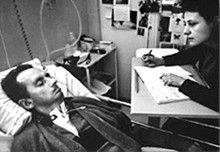 |
| Before his stroke |
"Is there in this cosmos of the keys to unlock my suit? A metro line terminal? A currency strong enough to buy my freedom? We must seek other. I'm going."
Imagine, a well dressed and successful businessman, carelessly cruising down the road in his red convertible. Then, he suddenly swerves off the road. Now imagine, the next thing he remembers is waking in a hospital to see his right eye being sewn up to avoid ulceration (Gerrard). He soon realizes that the words he is saying are not coming out, and the movements he is trying to make are not happening. As he will soon find out, he has become paralyzed. This story alludes to none other than Jean-Dominique Bauby. Once the head editor of Elle, he was hit by a stroke and paralyzed in 1995. His condition is referred to as “locked-in syndrome,” and, similar to a vegetative state, it caused him to be completely paralyzed. However, in a vegetative state, the mind is completely idle; with locked-in syndrome, the mind remains intact. In order to communicate, he was taught a simple system of blinking. Someone would read a string of letters in order of frequency, and he would blink on the correct letter. In the midst of languishing in paralysis, he aspires to fulfill one of his life’s ambitions: writing a book. Bauby understood that recording a book a single letter at a time figured to be an arduous task, for both him and an interpreter. Fortunately, a publisher in France accepted his idea and sent him a truly patient woman to take his dictation, Claude Mendibil (Knight). He thought of and ‘wrote’ an eloquently written French autobiography, consisting of 137 pages over 28 chapters. The average person would likely capitulate in this situation of extreme hardship. However, he maintained faith in the importance of applying his functioning mind in order to achieve a sense of purpose. In spite of the massive disbelief that writing would even be possible, he pursued his goal to prove the world, and his condition, wrong. In the end he passed away, taking only his life, because his greatest achievement, his masterpiece of literature, his story of dedication that anyone can appreciate, was left behind to be cherished by all. Jean-Dominique Bauby, through his intelligence, dedication to his impossible cause, and his ability to overcome adversity, proved that even with full paralysis, one can still be a hero.
One trait required for most types of heroism, especially Bauby’s, is having a considerable amount of intelligence. A significant aspect of locked-in syndrome is that although being physically paralyzed, the mind still functions properly. Without some type of outlet, one would likely go insane, thinking all the time but not being able to express one's thoughts. So, Bauby took up ‘writing’ as his voice in a speechless life. This was made possible by learning a simple system of dictation through blinking (Gerrard). The idea of writing a book by utilizing this grueling process seems ludicrous. He knew that if he wanted to change one word — even travel back a single letter — he would have to go through a process of extreme frustration and would end up losing so much time that it could become unbearable. Every blink was critical. "Perhaps, for this reason the prose is highly economical - beautifully crafted and lyrical, but not a word wasted" (Gerrard). It is understood and accepted that no one is able to blindly attempt writing an excellent piece and succeed. So what exactly is Bauby's secret to drafting? "Bauby describes how he would lie awake at night composing an entire section in his mind, and would dictate it the next day to his secretary through the laborious process of blinking" (Gerrard). The majority of people could not compose passages of text in their head, let alone remember the passages for hours, and recite it as a whole at a rate of four or five words per minute. Yet, using this system, Bauby composes each section with literary mastery. So, while one cannot definitively say that he drafted the book in its entirety, his work required the same amount of intelligence, if not more, to complete the final product. Intelligence, as a heroic trait, means that one has the ability to think and reason well in order to make the right decision.
 |
| The orginial version of his book, in French |
Bauby's dedication to his impossible goal is another one of the heroic traits he displays throughout his last few years. Although the main component of his goal was the book, it is clear that he accomplished more. This additional component was his dedication to beat locked-in syndrome as best as he could. "Most astonishing is the fact that Bauby 'wrote' the text at all. Robbed of the use of nearly every body part except his left eyelid, he dictated his tale, letter by letter, with some 200,000 blinks of his eye" (Schneider). His dedication to his goal is evident in the sheer magnitude of time and effort that the end product necessitated for its completion. The majority of people would retire on trying to accomplish anything in this miserable, vegetative state, but Jean-Dominique Bauby was unique. He maintained hope, even though he had all the reasons in the world to be down and doubt his abilities. That is his true heroism. While his determination to write showed his dedication to his book, he commitment to prevailing over his disease is apparent in his use of humor while describing misfortunes. "I would be the happiest man in the world if I could just properly swallow the saliva that permanently invades my mouth" (Bauby). In articulating his emotions, he shows dedication to persevere in two ways. He comically addresses his problem to show that he is not feeling sorry for himself. The humor also shows that he is dedicated enough to be willing to joke about his disease. In addition, his humor shows that he is dedicated even though he experiences specific hardships, keeping up his spirits. The reader understands the extent of his dedication from the general idea that he did complete his book, however hard it may have been. The lack of self-pity is eminent in his humorous writing, so the reader permits him to talk about his problems. At long last, he reached his goal because he was exceedingly dedicated to the cause, as any hero should be. Without the dedication to achieve something, no effort is put forth, and therefore nothing can be accomplished.
 |
| A diving bell |
The last of the three heroic traits he displays through words and actions is his ability to overcome adversity. One way to overcome adversity is to get over one's problems, stop feeling sorry for oneself, and move on. The main way he shows he can do this is through his humor. "Bauby's unsparing capacity for self-ridicule and sheer love of life that permeates its pages makes it one of the most considerable (if one the shortest) or modern masterpieces" (Gerrard). Bauby has the uncanny and almost wicked ability to write about his disease as if it was a joke. Where some parts of the book are more serious than others, he radiates the idea of self-ridicule and lack of self-pity, like any hero must. No hero can sit around feeling sorry for themselves, as they would surely perish. As a hero, one must move on to face the next task, eschewing whatever predicament the last hardship has left him with. To show his overcoming adversity, he uses a powerful metaphor to show the contrast from his body to his mind. It shows that his imagination conquers his immobilization. "Bauby compares his physical condition to a diving bell, a highly confining type of apparatus used by deep-sea divers. By contrast, he describes his mind as being like a butterfly, taking him far from the physical reality of the hospital bed" (Crumley). Bauby understands that he is being dragged down slowly and that no miracle is going to come blazing along to scoop him out of the ocean. It is coming to this realization that allows him to function. But being tolerant of immobility is only the first step. To carry on to the next step of tolerance, confidence, he uses his special gift: the "butterfly." His brain kept his drive growing, until he became capable of persevering beyond his affliction. It is this "butterfly" that sets him above others; it is his imagination that truly allows him to overcome adversity. A hero without imagination would likely be contemplating what is happening now, how something else should have been stopped, or who is to blame. But a true hero, with savvy and dedication, knows that the future is what is important, and that finding the explanation to unanswered questions is the genuine purpose of life.
 |
| A picture taken later in his life |
Jean-Dominique Bauby found himself in a position that no one hopes to find themselves in their life. Despite this state of affairs, he prevailed over harsh conditions by undertaking an impossible goal and succeeding. Every hero must hold the power to reason with logic and formulate the best decision. In addition, every hero must be devoted to their cause. Finally, every hero must be able to disregard the contingency of failure and accomplish their goal. Although Bauby unquestionably doubted himself at certain points time, he never conceded defeat to his affliction. In this way, he can be seen as a universal hero. His heroic traits and their explanations have indeed been catered to a specific situation. Nevertheless, anyone hoping to be a seen as a hero can apply these traits to themselves, since they have a broad-spectrum. His mind was fully intact, and it thrived, resembling a butterfly. Perseverance allowed him maintain the willpower to continue on through tough times and ultimately come out on top. In the end, his book sold 25,000 copies on the first day of publication, March 7th, 1997. Within its first week, it sold the 150,000 copies. In all, its total sales are in the millions (Gerrard). So, after an abnormal chain of events, the man who faced seemingly insurmountable tragedy triumphed. He accomplished the greatest feat of his life, all in the complete silence that is his diving bell. His butterfly, his brain, and his strength of mind were shown through his writing, and that was all he needed to pass on. While some would say that the previously successful man had lost all the success he had gained throughout his life, he proved them wrong. He proved that, however ironic, someone even in his condition can conclude life with a bang.
"Is there a key in the cosmos that can unlock my bubble? A currency valuable enough to buy my freedom? I have to look elsewhere. I'm going there" (Bauby).
Crumley, Bruce. "A triumph of the spirit.(paralyzed journalist Jean-Dominique Bauby's book 'Le Scaphandre et le Papillon' or 'The Bubble and the Butterfly')." Time. v149. n12 (March 24, 1997): p90(1). Student Resource Center - Gold. Gale. DEL NORTE HIGH SCHOOL. 6 May. 2010
Gerrard, Christine. "The Diving-Bell & the Butterfly by Jean-Dominique Bauby" The English Review. 18. 1 (Sept 2007): 16(2). Student Resource Center - Gold. Gale. DEL NORTE HIGH SCHOOL. 11 May. 2010
Knight, Judson. "Jean- Dominique Bauby"( French Writer). Contemporary Authors Online: (10/08/2003) Literature Resource Center. Gale, Cengage Learning. ALBUQURQUE ACADEMY. 5 May 2010.
Schneider, Karen S. "Blink of an eye. (magazine editor Jean-Dominique Bauby)." People Weekly. v47. n21 (June 2, 1997): p67(2). Student Resource Center - Gold. Gale. DEL NORTE HIGH SCHOOL. 6 May. 2010.
Page created on 5/27/2010 12:00:00 AM
Last edited 5/27/2010 12:00:00 AM
